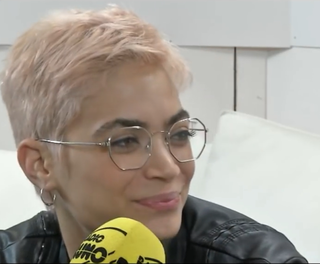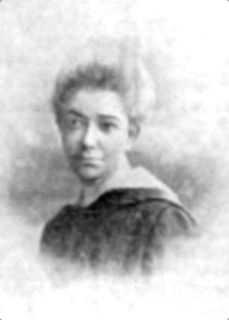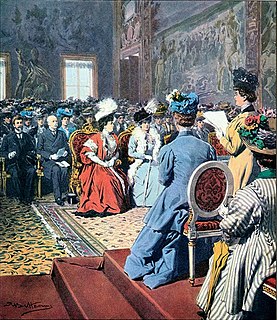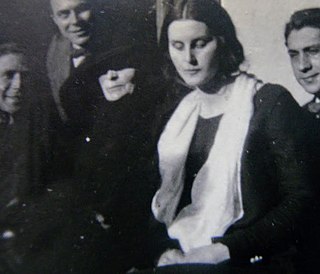Related Research Articles

Associazione Sportiva Dilettantistica Torres Calcio Femminile was an Italian women's association football club based in Sassari, Sardinia. The club was formed in 1980 and competed in women's Serie A until 2015. Torres's colours were blue and red. The team won seven scudetti and eight Italian Women's Cups. They were refused a license for the 2015–16 Serie A season due to debts.

The Academia della Farnesina, also known as the Accademia fascista maschile di educazione fisica or Accademia fascista della Farnesina, was a centre for sport and political education in Fascist Italy.

Maria Antonietta Macciocchi was an Italian journalist, writer, feminist and politician, elected to the Italian Parliament in 1968 as an Italian Communist Party candidate and to the European Parliament in 1979 as candidate of the Radical Party.

Paola Ogechi Egonu is an Italian female volleyball player of Nigerian heritage. She plays for Imoco Volley and is part of the Italy women's national volleyball team. She participated at the 2018 Montreux Volley Masters, 2018 FIVB Volleyball World Championship, and 2018 FIVB Volleyball Women's Nations League.

Elodie Di Patrizi, known professionally as simply Elodie, is an Italian singer and model. She first came to prominence as the runner-up of the fifteenth season of the show Amici di Maria De Filippi.

Valcar–Travel & Service is a professional road bicycle racing women's team which participates in elite women's races.
Emma Baeri is a Sicilian feminist historian and essayist. She has played an active role in organizing feminist political action and literary life in Italy along with her academic career.

Maria Alinda Bonacci Brunamonti was an Italian poet and scholar. Her poetry dealt with contemporary issues, and she became the first woman in Italy to vote.

Margherita Ancona was an Italian teacher and active in the women's suffrage movement in Milan. She was the secretary and later president of the radical bourgeois Comitato lombardo pro suffragio and member of the Italian branch of the International Woman Suffrage Alliance (IWSA). One of the leaders of the Italian women's suffrage campaigns, she was the only Italian woman to serve in her era on the board of the IWSA and was as a delegate to the Inter-Allied Women's Conference of 1919.
Alice Schiavoni Bosio was an Italian suffragette. She served as the director of the journal Attività Femminile Sociale from its founding in 1913 through 1916. Affiliated with the Consiglio Nazionale delle Donne Italiane, a member of the International Council of Women, Schiavoni was one of the participants in both the Women at the Hague Conference of 1915 and the Inter-Allied Women's Conference of 1919.

The Consiglio Nazionale delle Donne Italiane (CNDI) or National Council of Italian Women is an Italian federation of women's associations, including those admitting both men and women, bent on improving conditions for women. Founded in 1903 as the Italian branch of the International Council of Women, it originally brought together organizations from federations representing Rome, Lombardy and Piedmont and was chaired by Gabriella Rasponi Spalletti until her death in 1931. From the beginning, the council has been open to all women, irrespective of their political or religious views. Still active today, it is involved in helping with the establishment of women's cooperatives, educating illiterate women, assisting migrants and developing the role of women in the professions. It also combats prostitution and the trafficking of women.
The Comitato pro suffragio femminile was an Italian organization founded in 1905 in support of women's voting rights. Among the most active participants were Anna Maria Mozzoni, Linda Malnati and Carlotta Clerici.

Elisa Agnini Lollini was a pioneering Italian feminist, pacifist, suffragist and politician. In 1896, she was a co-founder of the Associazione per la Donna which not only supported women's civic and political rights but called for the withdrawal of Italian troops from Africa. A member of the Comitato Pro Suffragio, in 1910 she urged the socialist party to support votes for women. She also fought for improved women's rights, especially in the areas of education, divorce, equal pay, and working conditions.

Milena Bertolini is an Italian former footballer and current manager of the Italy women's national team. As the national team coach, she led Italy to qualify for the 2019 FIFA Women's World Cup following a twenty year absence.

Maria Magnani Noya was an Italian lawyer, politician, and former Member of European Parliament. She was the first female mayor of Turin from 1987 to 1990. Noya was a Vice-President of the European Parliament in the Third European Parliament from 1992 to 1994.

Alessandro Casati was an Italian academic, commentator and politician. He served as a senator between 1923 and 1924 and again between 1948 and 1953. He also held ministerial office, most recently as Minister of War for slightly more than twelve months during 1944/45, serving under "Presidente del Consiglio" Bonomi.
Maria Rosa Cutrufelli is an Italian writer and journalist.
The Rivolta Femminile refers to: the first female-only feminist group, created in Rome in 1970 with a meeting between Carla Lonzi, Carla Accardi, and Elvira Banotti; the manifesto they developed, which appeared on the walls of Rome in July 1970, is "The Manifesto of Female Revolt"; the "Women's Revolt" publishing house, founded in 1970 in Milan by Carla Lonzi, through it the writings of the group were published.

Elisa Johanne Rosa Maria Boglino was a Danish-Italian painter, active in Denmark and Italy.
The Italy women's national football team represents Italy in international women's association football and is controlled by the Italian Football Federation.
References
- ↑ "Elisa Agnini, la suffragetta italiana" (in Italian). Pasionaria. 22 March 2016. Retrieved 5 February 2019.CS1 maint: discouraged parameter (link)
- ↑ Maffeo, Stefania. "La storia dell'associazionismo femminile italiano" (in Italian). Storiain.net. Retrieved 5 February 2019.CS1 maint: discouraged parameter (link)
- ↑ Angeleri, Maria Cristina (21 July 1994). "Dall'emancipazionismo all'interventismo democratico: il primo movimento politico delle donne di fronte alla Grande Guerra". dprs.uniroma1.it (in Italian). Rome, Italy: University of Rome "La Sapienza". Archived from the original on 19 October 2016. Retrieved 3 February 2019.CS1 maint: discouraged parameter (link)
- ↑ "Jole Bragiola (Bellini) in Bersellini (1872 – 1964)" (in Italian). MilanoAttraverso. 8 April 2018. Retrieved 6 February 2019.CS1 maint: discouraged parameter (link)
- ↑ Scomazzon, Francesco (2016). "Concordia parvae res crescunt, discordia maximae dilabunrur" (PDF) (in Italian). DEP No. 31. p. 51. Archived from the original (PDF) on 14 September 2016. Retrieved 6 February 2019.CS1 maint: discouraged parameter (link)
- ↑ "I gruppi femminili presenti nel nostro Paese, 1920 Almanacco della donna italiana" (in Italian). Donne iere oggi e domani. Retrieved 6 February 2019.CS1 maint: discouraged parameter (link)
- ↑ Gori, Claudia (2003). Crisalidi. Emancipazioniste liberali in età giolittiana. FrancoAngeli. pp. 21–. ISBN 978-88-568-2801-6.